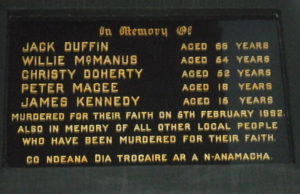 For most people, betting shops are just places that they can head to place a wager on the greyhounds, a horse race or a football match, amongst other things. They are somewhat benign enterprises, with the vast majority of bettors using them sensibly to have a flutter or two when they’ve got some disposable income. For a small minority, however, they are businesses to be targeted on account of the fact that they’ve got vast amounts of money flowing through them at any given moment. These nefarious types want a quick book without having to put any of their own money at risk to get it.
For most people, betting shops are just places that they can head to place a wager on the greyhounds, a horse race or a football match, amongst other things. They are somewhat benign enterprises, with the vast majority of bettors using them sensibly to have a flutter or two when they’ve got some disposable income. For a small minority, however, they are businesses to be targeted on account of the fact that they’ve got vast amounts of money flowing through them at any given moment. These nefarious types want a quick book without having to put any of their own money at risk to get it.
As a result, there have been plenty of fascinating crimes that have taken place at betting shops over the years. It is possible, if not likely, that you’ll have heard of some of these instances of law break on account of the fact that they made the news when they happened. They are all interesting in their own way, but obviously come with a big sticker that says ‘Don’t Try This At Home’. These are examples of law breaking taken to an extreme, with bookmakers’ premises being the location for the crimes that are committed.
The Belfast Mass Shooting

Not all crimes that take place at betting shops are to do with the fact that they have a lot of money in them. Sometimes they are used as political footballs, which is the case with what happened at Sean Graham’s premises in Belfast back in 1992. At the time, Northern Ireland was still falling foul of The Troubles, in which religion was used as an excuse for two different sides to fight and kill each other. Obviously the topic of The Troubles is far more complex than we can even begin to cover here, but it is worth bearing it in mind.
On the 17th of January 1992, a roadside bomb went off at a crossroads between Omagh and Cookstown in Northern Ireland. A van with 14 construction workers who had been repairing a British Army base was destroyed, with right of the men dying as a result. One of the dead and two of the injured were British soldiers and the Provisional Irish Republican Army claimed responsibility, citing the dead ‘collaborating with the forces of occupation’. A retaliation was expected, with the people placing bets at Sean Graham’s the unfortunate victims.
The bookmaker’s shop was in an area that was predominantly Catholic and Irish nationalist, which is why it was targeted by members of the Ulster Defence Association. They turned up at the shop and opened fire indiscriminately, using an assault rifle and a handgun. Four people were killed on the scene, whilst another later died at hospital, with the ages of the victims ranging from 15 to 66. The UDA claimed responsibility under the name of the Ulster Freedom Fighters, declaring that the shooting was direct retaliation for the Teebane bombing by the Provisional IRA weeks before.
It was later discovered that the Royal Ulster Constabulary had been engaging in collusion with members of the UDA who had been working as informers, with another six murders believed to have been carried out as a result of active collaboration between police and the UDA. Marie Anderson put a report on the matter together, saying that there was no evidence that the shooting was preventable but that all victims were ‘systemically failed by the British state’, on account of the fact that gaining information from informants was given precedent over protecting members of the public from paramilitary crimes.
Fraudsters Took Ladbrokes & Coral For £600,000-Plus

Whilst what happened in Belfast was obviously horrendous and a genuine tragedy, most of the crimes committed at betting shops are for financial gain. That is demonstrated by what happened at Ladbrokes and Coral shops across the United Kingdom in 2020 and 2021. It involved four men using £20 and £50 notes that had been coated in plastic and had a plastic lead attached to them. They fed them into slot machines at betting shops, waiting until the money had been registered as deposit before yanking them back out again in order to stop them from being taken.
33-year-old Charlie Shaw, 40-year-old Thomas Wheatcroft, Michael Sadgove-Tarrant, who was 37-years-old and 59-year-old Paul Hubbold worked together to commit 168 different frauds at betting shops around the country. They visited either a Ladbrokes or a Coral shop in the likes of London, West Midlands, Merseyside and Essex between July 2020 and June 2021 in order to pull off their trick. It was only discovered when staff cashed up their machines at the end of the day and noticed thousands of pounds were missing from the total they’d expected.
When the CCTV at the different shops was inspected, it revealed the man all wearing the same clothing. When police arrested Shaw, Wheatcroft and Sadgove-Tarrant in Essex, they discovered bags of clothing including 20 baseball caps. When Coral and Ladbrokes did the sums, the amount that they had lost was calculated at £663,556. When they went to court, all four men pled guilty to conspiracy to commit fraud and were issued with different jail terms in addition to lifetime bans from bookmakers around the United Kingdom. What they’d taken amounted to a ‘significant loss’ for businesses, said a police officer working on the case.
The Betting Shop Worker Who Orchestrated An Armed Robbery
 What is the best way of being involved in a crime but ridding yourself of any suspicion? It is to be the person that is robbed, of course, which is what Natalie Solari decided to ensure would happen back in 2018. She was the manager in a Coral bookmaker’s shop at the time, with the 30-year-old mum of two never having been involved with the police before then. On the day that the robbery happened, Solari was working behind the counter when Tyler McNeill came in and pointed a fake gun at her, instructing that she should put all of the money in the shop onto the counter.
What is the best way of being involved in a crime but ridding yourself of any suspicion? It is to be the person that is robbed, of course, which is what Natalie Solari decided to ensure would happen back in 2018. She was the manager in a Coral bookmaker’s shop at the time, with the 30-year-old mum of two never having been involved with the police before then. On the day that the robbery happened, Solari was working behind the counter when Tyler McNeill came in and pointed a fake gun at her, instructing that she should put all of the money in the shop onto the counter.
As onlookers watched on the apparently terrified Solari did exactly that, seeing McNeill and his accomplice, Daniel O’Reilly, flee the shop with around £11,000. They got into a car being driven by Simon Bennett and disappeared from the scene. The amount of money that was taken immediately raised the suspicions of Coral’s higher-ups, given that bookmakers encourage staff to remove money from the premises every day. Solari was the only person working, so it seemed as if she had allowed the cash to build-up to a decent amount.
As police began to investigate, they discovered a series of messages between Solari, O’Reilly and McNeill, as well as evidence that it was Solari herself that had arranged a car for Bennett to use as the getaway driver. Though her and Bennett denied the crime, McNeill and O’Reilly pled guilty and almost certainly benefitted from doing so when it came to sentencing. McNeill was given an eight-year term, with O’Reilly receiving a sentence of seven years. Bennett got five years, but Solari was given a prison sentence of 12 years.
The Crime Gang That Made £1 Million From A Ladbrokes Cashier
 Quite why it is that Ladbrokes and Coral appear so regularly in this list isn’t clear, but it was Ladbrokes that 22-year-old Paris Markham was working for when her then-boyfriend persuaded her to help he and his crime gang partner Daniel Constantin steal more than £1 million from the betting company. Markham was working as a cashier at the bookmakers in the Edmonton area of London on the 30th of June 2019 when Aurica Vaduva and Constantin came into the shop and placed 22 tricast bets on horse races.
Quite why it is that Ladbrokes and Coral appear so regularly in this list isn’t clear, but it was Ladbrokes that 22-year-old Paris Markham was working for when her then-boyfriend persuaded her to help he and his crime gang partner Daniel Constantin steal more than £1 million from the betting company. Markham was working as a cashier at the bookmakers in the Edmonton area of London on the 30th of June 2019 when Aurica Vaduva and Constantin came into the shop and placed 22 tricast bets on horse races.
Markham accepted ineligible betting slips and paid them out as winners, with the bets placed being worth £90 or £95 each. They made anywhere between £5,000 and £100,000 per bet, resulting in a total payout of more than £1 million over the course of a few hours. The money was then sent to bank accounts and moved into cash withdrawals, high value purchases, credit transactions and the buying of foreign currency by an organised crime group either on the day of the payout or the following day, with prosecutors alleging that Markham was the ‘inside woman’.
Markham herself claimed that she was approached and threatened on her way into work, being told what to do by Vaduva and Constantin. As a result, she felt as though she would have been in danger if she had followed standard procedure and invalidated the betting slips. What made her argument somewhat flimsy was the fact that Vaduva was her boyfriend at the time of the incident, receiving £20,000 of the proceeds into her bank account. There were numerous other members of the conspiracy who were guilty of attempting to launder the money obtained illegally.
The Shop Manager Murdered For Less Than £300
 Andrew Iacovou was 55-years-old and had worked as the manager of a Ladbrokes betting shop for many years by May of 2013. Good as his job, Iacovou knew most of the customers who came in and was friendly with a number of them. On the 24th of May 2013, the shop was due to close at 10pm, having opened at 8.30 in the morning. One face that had only recently started going to the shop was that of Shafique Aarij, who spent most of his time using the Fixed Odds Betting Terminals that were located in the bookmaker’s.
Andrew Iacovou was 55-years-old and had worked as the manager of a Ladbrokes betting shop for many years by May of 2013. Good as his job, Iacovou knew most of the customers who came in and was friendly with a number of them. On the 24th of May 2013, the shop was due to close at 10pm, having opened at 8.30 in the morning. One face that had only recently started going to the shop was that of Shafique Aarij, who spent most of his time using the Fixed Odds Betting Terminals that were located in the bookmaker’s.
On the 24th of May, Aarij complained that there was a problem with one of the machines, so Iacovou came from behind the counter to try to fix the problem. He did so, closing up the shop at 10pm before going his job of cashing up the machines, making it home to his wife at about midnight. He was in again early the following morning, briefly meeting up with a fellow Ladbrokes employee from a different shop who had come to get some spare keys. The assistant manager of the shop wasn’t expected until about lunchtime, so Iacovou didn’t think he’d see anyone.
The first customer to arrive on the premises was Shafique Aarij, who had a shoulder bag and headed straight to the FOBTs. Not longer after placing bets, Aarij claimed that there was a problem with the machine again, leading to Iacovou coming from behind the counter to help. As he unlocked the door, he was pushed in by Aarij, who grabbed him by the neck before the pair of them engaged in a struggle. At this point, Aarij took a claw hammer from the bag over his shoulder and struck Iacovou over the head with it nine times in total.
Once the manager had been disposed of, Aarij turned his attention to the safe in the shop, eventually stealing just £296. The money was immediately wired to Pakistan. CCTV footage from the shop that the police managed to obtain showed him looking for any cash that he could find as his victim lay on the floor dying. When the case went to court, Aarij was sentenced to 26 years in prison for the murder of Iacovou and the robbery of the shop. Though no amount of money would have made it acceptable, to kill a man for less than £300 somehow makes it even more tragic.
